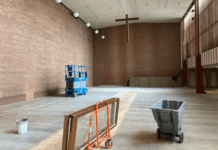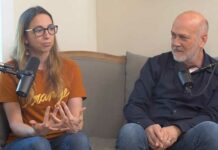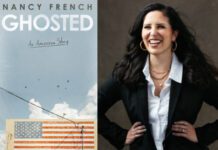It was in the second neighborhood we were able to make a stand. Only one home was on fire so we focused our efforts on that home (and later one behind it). The focus of my prayer during all of this was that the wind would die down. Fortunately it did and we were able to save the rest of the neighborhood.
As we were fighting the fire so much went through my head. It was surreal watching everything people had spent their lives acquiring burn up so quickly but I didn’t really have time to give it much thought at that moment. I was thankful I had experienced a controlled training “burn” as it gave me great confidence that my gear would keep me protected. I was struck by how the firefighters didn’t hesitate to aggressively fight the fire—and not give up even when it seemed overwhelming—to me.
After seven hours of fighting in two neighborhoods, we finally took a break to rest and get some food at a local fire department. Soon after going back in service we were released to go home—exhausted. I thought I’d sleep well when I got home but the adrenalin and smoke in my lungs didn’t let me for a couple of nights.
ChurchLeaders: Obviously the wildfire had a devastating impact on people’s lives and property. What have you observed about its impact on people in the community spiritually? What has been the impact on the firefighters themselves?
Scott Ross: My role at American Bible Society has given me access to provide a response on the backend (after fighting fire on the front end). People are in trauma. One victim I spoke to was so shaken he didn’t really know where to begin. When I asked how he was, he said he’s been more irritable with his kids, and he’s already run looters off his property. When he saw the Scripture booklets I was holding from American Bible Society, he asked if he could have them. People experiencing this kind of trauma need Scripture tools to help them process. Sometimes they need to lament, and Psalms helps. They need to know God provides comfort. They need to know there is hope even in the pain. And, having something tangible with biblical truths to hold onto is really helpful.
Regarding the firefighters…I’ve done much processing and I’ve encouraged the firefighters to process too. I told them how helpful it was for me to write out what happened. I’ve debriefed with two of the officers with whom I was embedded, and it was good just to discuss what happened. Leaving a scene doesn’t mean the scene stays there. What they see and experience goes home with them and adds to the normal stressors of life. They experience emotional trauma when they respond to many calls and may not be aware. For those who don’t understand what emotional trauma is or how to begin processing one resource we point them to www.traumahealingbasics.org. It’s a free resource from American Bible Society that defines what emotional trauma is and tools for how to begin healing from it.
ChurchLeaders: What are your responsibilities in your role with the American Bible Society (ABS)? How is ABS helping people who have been impacted by the wildfire?
Scott Ross: My primary job at American Bible Society is to serve churches, networks and denominations with Bible access (e.g. translation and provision), engagement (e.g. Healing the Wounds of Trauma small group resource and resources for our Armed Services) and advocacy (State of the Bible research) resources and opportunities to help them accomplish their mission.











